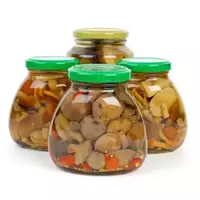Canned mushrooms

Mushrooms occupy a fairly important place in the diet of the vast majority of the inhabitants of our latitudes. Scientifically, fungi are a vast and independent kingdom of wildlife. Interestingly, fungi are present in all biological niches known to humans. For this reason, it is quite difficult to assess the entire importance of mushrooms both for human life and for the economic activity of people.
A large number of mushroom species have long been used by people for culinary purposes. In addition, fungi are a valuable natural material that is used in pharmacology and medicine. Mushrooms are one of the most important parts of an entire branch of human scientific activity called biotechnology. This science studies the possibilities of using living microorganisms, including mushrooms, for the benefit of human civilization.
It is worth noting that in addition to invaluable benefits, mushrooms can be quite severe damage to human health, as well as life. The thing is that mushrooms are divided into two main groups - edible and inedible. Edible mushrooms have found widespread use in cooking. The mushrooms are boiled and fried, dried, frozen, preserved and marinated.
On a mushroom basis, a large number of various culinary products are made. Mushrooms are used to make soups, as well as sauces, main dishes and snacks. In addition, mushrooms are a tasty and nutritious filling for homemade baking. Canned mushrooms are a very popular product that is in constant demand among domestic housewives.
Canned mushrooms can be purchased from many grocery stores. However, until now, most amateur mushroom pickers are preserved at home. To get a tasty, and most importantly healthy food product, it is worth following some recommendations in the process of making canned mushrooms.
For example, young and dense in structure, not worm and not damaged mushrooms are suitable for canning. Among the main types of canned mushrooms, the following can be distinguished: canned porcini mushrooms, waves, ginger and chanterelles, as well as mushrooms, oilseeds, aspen mushrooms, bolos, boroviki and others. Assortments are often made from canned mushrooms.
It is noteworthy that the calorie content of canned mushrooms, however, as well as the vitamin and mineral composition of the product, depend primarily on the variety of natural raw materials that were used in the preservation process. However, the average calorie level of canned mushrooms is at a fairly low level and is only 18 Kcal, which are per 100 grams of product.
Canned mushrooms are served to the table as independent snacks. Usually canned mushrooms are seasoned with vegetable oil, sour cream, vinegar, as well as onions. Canned mushrooms are included in some salads, as well as vegetable and meat snacks.
canned mushrooms 18 kCal
Energy value of canned mushrooms (Ratio of proteins, fats, carbohydrates - ju):
Proteins: 2.23 g (~ 9 kCal)
Fats: 0.68 g (~ 6 kCal)
Carbohydrates: 0.88 g (~ 4 kCal)
Energy ratio (bj | y): 50% | 34% | 20%
 Español
Español Français
Français Português
Português Русский
Русский 简体中文
简体中文 繁體中文
繁體中文 日本語
日本語 한국어
한국어 العربية
العربية Türkçe
Türkçe Қазақ
Қазақ Deutsch
Deutsch Italiano
Italiano Українська
Українська
